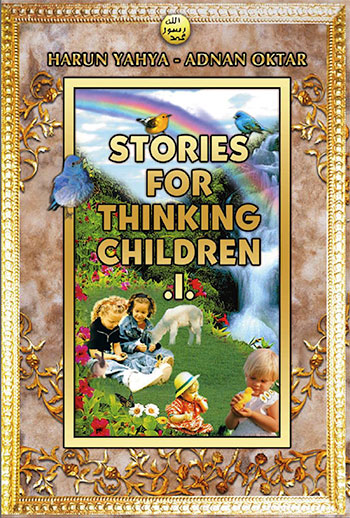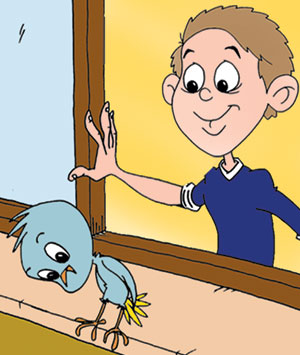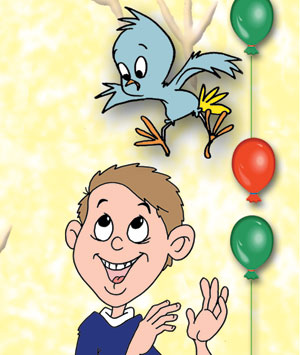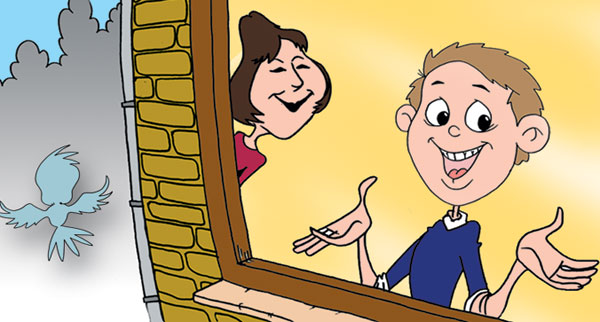Bigotry: The Dark Danger
Stories for Thinking Children 1

DOWNLOAD THE BOOK
CHAPTERS OF THE BOOK
- Amar and the Tortoise
- Hussein and the Elephant
- What Rasheed's Brother Taught Him
- Omar and the Penguin
- Jamal and the Parrot
- There's Good in Everything
- Ahmad and the Happy Duck
- Cute Long-Tailed Squirrels
- It's Important to Follow the Good Word
- The Cleanliness of Believers
- Naeem and the Pretty Peacock
- Anwar and the Little Bird
- Ali's Little Friend
- Maqsud and the Kitten
- Sayid and the Squid
- Kamal and the Seahorse
- Kareem and Grandpa Hassan
- Grandpa Uthman and his Grandson
- Our Class
< <
12 / total: 19
Anwar and the Little BirdWhile Anwar was walking home from school, it started to rain very hard. After dinner, before starting his homework, he asked his mother if he could watch the rain for a while. She said he could watch it for a short while. Anwar went to the window and started to watch the rain pouring down outside. There were people walking in the street with umbrellas, and others without umbrellas pressing themselves against the buildings. After a short time, puddles of rain began to form all around. Passing cars splashed water on the sidewalks and people fled from the curb to avoid getting wet. Anwar thought how nice it was to be in the house and that he should thank Allah more for giving him food and a warm house to live in. Right at that moment, a sparrow landed on the window sill. Anwar thought that the poor bird must be looking for shelter from the rain and he immediately opened the window. "Hi, my name is Anwar," he said. "You can come in if you want." "Thank you, Anwar," said the little bird. "I would like to wait inside until the rain stops."
"You must be very cold outside," Anwar sympathized. "I've never seen a bird up this close before. Look how thin your legs are! How can they hold your body up?" "You are right, Anwar," the sparrow agreed. "We birds have thin legs compared to our bodies. But, in spite of that, they can hold our bodies up quite easily. There are many muscles, veins and nerves inside them. If our legs were any thinner or thicker it would be harder for us to fly." "Flying must be a wonderful feeling," mused Anwar. "Your wings are thin, too, but you can still fly with them. So, how is it that you can fly such long distances without getting tired?" "When we first take flight we use a lot of energy because we have to support the weight of our whole body on our thin wings," began the sparrow. "But once we are in the air, we relax by letting ourselves be carried along by the wind. So, because we expend less energy this way, we don't get tired. When the wind dies down, we start to flap our wings again. Because of this advantage that Allah has created for us, we can fly very long distances."
Anwar then asked, "How can you see around you when you are flying?" The sparrow explained: "Our best sense organs are our eyes. Besides giving us the ability to fly, Allah has also given us a superior sense of sight. If we didn't have this superior sense of sight along with our miraculous ability to fly, it would be very dangerous for us. We can see far away objects more clearly than human beings can, and we have a wide field of vision. So, when we see a danger ahead, we can adjust the direction and speed of our flight. We can't move our eyes around like humans can because our eyes are set in their sockets. But we can move our heads and necks around quickly to increase our field of vision." Anwar understood: "So, that's why birds are always moving their heads: to see around them. Are all birds' eyes like that?" "Owls and other night birds have very large eyes," the sparrow continued. "By means of some special cells in their eyes, they can see in dim light. Because of this, owls can see very well to hunt at night. There are also kinds of birds called water birds; Allah has created them so that they can see very well in the water. They dip their heads under the water and catch bugs and fish. Allah created the ability in these birds so that they could see clearly under water and catch their prey." "Not all birds' beaks are the same, though. Why is that?" Anwar asked. "Allah created different kinds of beaks for different kinds of birds to do very different jobs," came the reply. "Our beaks are perfectly suited to the environment in which we live. Caterpillars and worms are very delicious for us bug-eating birds. With our thin, sharp beaks we can easily pick up caterpillars and worms from under tree leaves. Fish-eating birds usually have long bills with a scoop-like shape on the end to catch fish easily. And birds that feed on plants have beaks that let them easily eat the kind of plants they like. Our Lord has provided perfectly for every creature on the Earth by giving it the abilities it needs." Anwar had another question for the sparrow: "You don't have ears like I have, but you can still hear me very well. How is that?"
"The sense of hearing is very important for us birds. We use it to hunt and warn one another about any potential danger so that we can protect ourselves. Some birds have hearing membranes that allow them to hear the slightest sounds. An owl's ears are very sensitive to sounds. It can hear levels of sound that human beings can't," the sparrow told him. Anwar then enquired: "You birds sing very nicely. I like listening to you. What do you use your voices for?" The bird nodded: "Some of us have different songs to put our enemies off the track. Sometimes we make our nests in holes in tree trunks, and when an enemy tries to get in, we hiss like snakes. The invader thinks there is a snake in the nest, which allows us to protect our nests." "What else do you do to protect your nests from enemies?" wondered Anwar. "We build many decoy nests to mislead our enemies," said the bird. "In this way we put invaders off the track and protect our nests and eggs that we have hidden in the area. To protect our nests from poisonous snakes, we hide the entrances and make them very complicated. Another precaution is building our nests in trees that have thorns on their branches." Have they not looked at the birds above them, with wings outspread and folded back? Nothing holds them up but the All-Merciful. He sees all things. (Surat al-Mulk: 19) "How is it that some birds can swim in water? And why can't all birds swim?" Anwar asked his friend. The sparrow replied: "Allah has created some of us with the ability to swim. He has given them webbed feet to enable them to swim when they go into the water. Others of us have thin toes with no webs. So, apart from water-birds, birds can't swim." "Just like flippers!" Anwar exclaimed. "When I swim with flippers on, I can go much faster." "There are some kinds of birds that have these flippers from birth," said the bird. While Anwar and the bird were having this conversation, his mother told him to go to his room and do his homework. At the same time, the rain stopped, too. Do they not see the birds suspended in mid-air up in the sky? Nothing holds them there except Allah. There are certainly Signs in that for people who believe. (Surat an-Nahl: 79) Anwar told his friend: "Now I have to go to my room and do my homework. Tomorrow I will tell my friends about your special abilities, and how Allah has created you and all other creatures with such perfect creative artistry." "The rain has stopped, so I can go back to my nest," the sparrow answered. "Thank you for taking me in, Anwar. When you tell your friends about us, will you also tell them to care about us and not throw stones at us or at any other creature?" "Yes, I will tell them for sure," agreed Anwar. "May Allah protect you." Anwar opened the window and the bird flew away immediately, flitting through the air. Anwar thought about the perfection in Allah's creation and sat down to do his homework.
|
12 / total 19
You can read Harun Yahya's book Stories for Thinking Children 1 online, share it on social networks such as Facebook and Twitter, download it to your computer, use it in your homework and theses, and publish, copy or reproduce it on your own web sites or blogs without paying any copyright fee, so long as you acknowledge this site as the reference.


